Strange warriors of Novgorod
But Vasily Buslaev, who, like Gavrilo Oleksich, by the will of S. Eisenstein, became the hero of the famous film “Alexander Nevsky,” was actually not seen by anyone in the defense of Russian lands, and weapon he is not heroic - most often referred to as "black elm" (club).
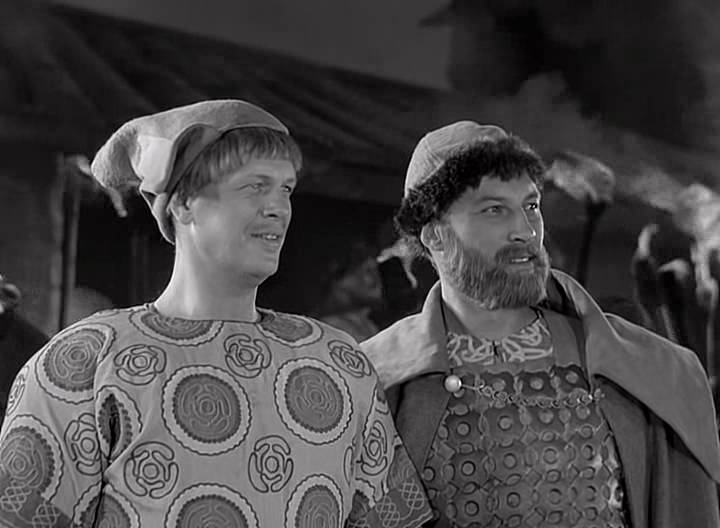
Two epics about this bogatyr are known: “Vasily Buslaev and Novgorod” (recorded 20 variants) and “Vasily Buslaev's trip” (15 records).
IN AND. Dahl reports that the word "buslay" means literally "a rakish mot, a reveler, a broken fellow." Meanwhile about the father of Basil says:
With Pskov he did not flinch,
And with Mother Moscow did not stop talking. ”
Therefore, there is reason to believe that “Buslaev” is not a patronymic, and, moreover, not a surname, but a characteristic of this bogatyr, who has already become from 7 years:
Joking - from unkind joke
With boyar children, with princely:
Which pulls the hand - hand off,
Which by the leg - the leg off,
Two or three together will collide -
lie without a soul. "
And when Vaska grew up, his “mischief” and “jokes” began to have a purely mercantile character. Gaining a crowd of 30 people, many of whom, judging by their nicknames (Novotorzhenin, Belozerianin and others), were alien people, not Novgorodians, he began to go on peers, starting quarrels with the “merchants of the rich” and “Novgorod men”. And even representatives of the Church (“old man” Pilgrim) did not escape Vaskin’s “mischief”. In some texts, this old man is also Buslaev’s godfather:
I taught you to read and write, I taught you to do good deeds, ”he appeals to him.
To which Vaska replies: "When you taught me, I took the money."
And further:
Water carries you, but all at the wrong time.
And he hit his blacked out visor
And he killed the starcheschis, his cross father. "
As a result, “the townspeople subjugated and made peace” and pledged to pay “every year three thousand”. Some researchers believe that the “struggle of the Novgorod political parties” is reproduced in the epic. However, we can rather assume that Vaska appears here as a typical “criminal authority” and racketeer.
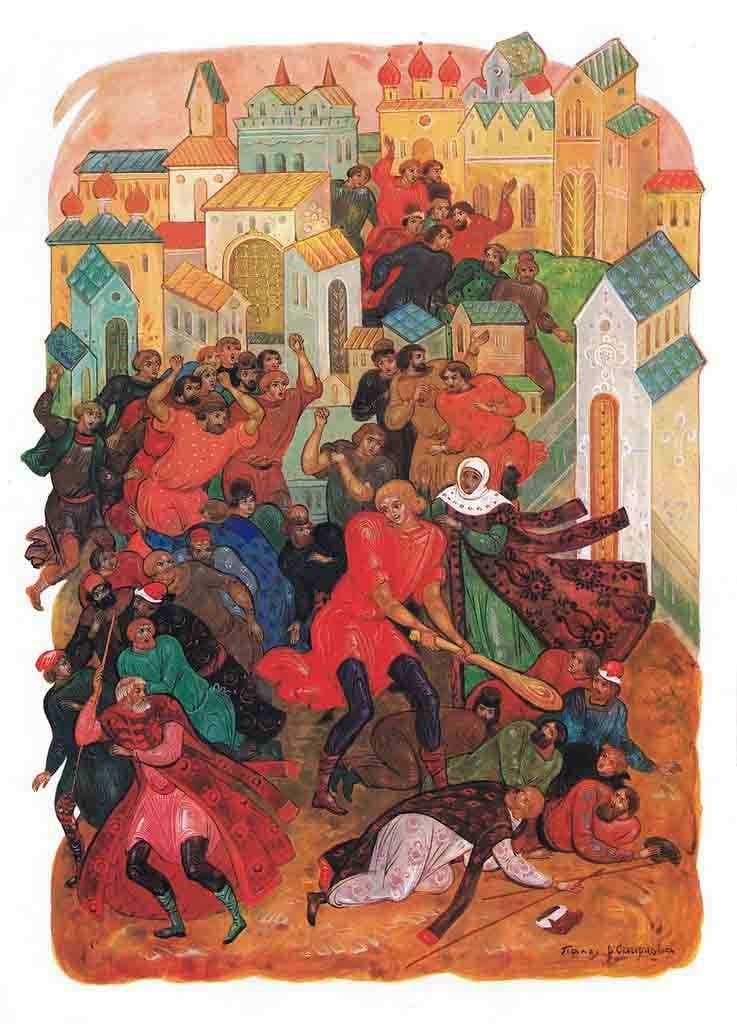
It is not excluded that the team of Buslaev could also provide services for the protection of their clients, or, conversely, arrange attacks on their opponents. The existence of such “brigades” even in the 15th century confirms Metropolitan Jonah, who reported in a letter to the Novgorod archbishop Euthymius that they exist in Novgorod:
The cognitive tests that Buslaev’s candidates are subjected to are curious: it was necessary with one hand to raise a glass of wine and a half buckets and drink it, after which Vasily also beat them on the head with his favorite “black elm”. It is clear that after such tests a person became either an invalid or a psychopath with post-traumatic disorders of personality and behavior. However, I think that in this case we have a place with a hyperbolic description of the ritual of initiation into the ears: the wine cup was maybe big, but not “half a bucket”, and the blow of the club was probably purely symbolic.
However, in the same epic it turns out that there is a bogatyr in Novgorod and is stronger than Buslaev. More precisely - bogatyrka. This is some kind of a black woman, a maidservant of his mother, who, by her order, in the midst of the “epic” street fight, easily drags the unprofitable Vaska from the street and locks him in the cellar. Some explain this unexpected obedience of violent Buslaev by his fear of disobeying his mother, but this is completely not in the character of this hero, who, in his own words, does not believe, either in sleep or chok, but only in the very, notorious, black elm. Further, it is already told about the “exploits” of the blacksack. Having delivered Vaska “by appointment,” this girl, seeing that his friends are defeated, “drops maple buckets from the cypress arm”, and begins to wield them like a club, nailing many opponents “to death”.
And then, having spat on the order of his mistress, he releases Basil, who completes the pogrom of the “Novgorod muzhiks”, which ended with the agreement on the payment of that annual “tribute”.
In the following epic, Vasily suddenly realizes that he has:
Under old age, it is necessary to save the soul. "
Or, in another version:
"I have made a great transgression,
He has beaten many men of Novgorod ”.
Equipping the ship, he turns to his mother:
To go to me, Vasily, in Erusalim-grad,
With all the squad of horror,
I pray to the Lord
Enclose the holy shrine
In Yerdane River, swim. ”
Knowing the price of these good intentions of her son, the mother gives him a blessing with the proviso:
And do not wear Vasily damp earth. "
However, Vaska does not need blessing on such conditions, he “dodges like a loach around her,” and the mother concedes, even helps with the equipment:
Mother's heart dissolves,
And she gives a lot of lead, powder,
And gives Basil grain stocks,
And gives weapons a long,
Take care of you, Vasily, rampage your head. "
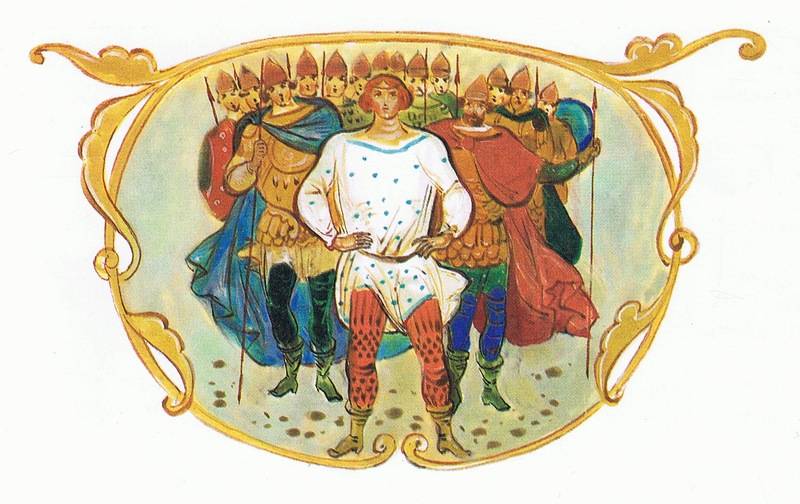
On the way to Jerusalem, Buslaev's band meets with the robbers, who are “three thousand, robbing beads, galleys, ships are scarlet”. But, having “tasted” Vaskin's “elm tree”, the robbers “bow down” to him, offer rich gifts and even give a guide.
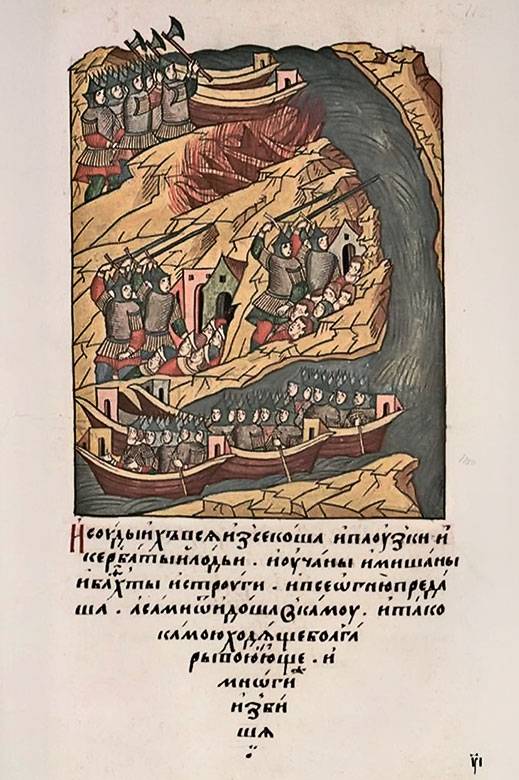
Another obstacle on the way is “Suboy fast, but the shaft is thick,” that is, a strong current and a high wave, the experienced team of Basil successfully copes with this. Further, on the Sorochinsky mountain (from the name of the river, which is now called the Tsaritsa — a tributary of the Volga), Buslaev sees the skull, and does not find anything better than to kick it. And hears a terrible warning:
I am lying on the Sorochinsky mountains,
Yes, lie to you on my right hand. "
Images of the skull and snakes with similar inscriptions were often seen on facial synodics common in medieval Russia. For example:
The words of a dead head do not make the slightest impression on Vasily; moreover, it seems that he perceives them as a challenge. So, for example, having reached the Holy Land, contrary to warnings, bathes naked in the Jordan River. On the way back, on the same Sorochinsky mountain, where the skull lies, Buslaev already finds
A stone thirty cubits wide,
In the valley is a stone and forty cubits,
Its height is a pebble, for three elbows. ”
The stone is clearly grave, it has an inscription prohibiting jumping over it. However, there are texts in which the inscription, on the contrary, has the character of a call: “Who will skip this stone and jump?”. In any case, the character does not allow Buslaev to just pass by: he jumps over the stone himself, and orders his own companions to jump. Then, she decides to complicate the problem: according to one version, she jumps over a stone along, not across, according to another - “face back”. And here luck finally leaves this hero:
And then he was killed under the stone. "
The satellites buried him, as predicted - near the skull.
Here we are probably dealing with pre-Christian ideas that the dead can take with them people who are stepping over a corpse, or through a grave. It is especially dangerous to step over the grave along, since in this case the person does not just cross the path of the deceased, but share his path with him.
Of course, attempts were made to correlate the epic Vasily Buslaev with any real historical face. I.I. Grigorovich (a Russian historian of the 1171th century) and S.M. Soloviev talked about the Novgorod posadnik Vaska Buslavich, whose death is reported by the Nikon chronicle (written in the middle of the XVI century) under 1171. In addition to Nikonovskaya, the death of this posadnik is mentioned in the Novgorod Pogodinsky chronicle ( written in the last quarter of the XNUMXth century): "The same (XNUMX) year, the posadnik Vasily Buslaviev died in Veliky Novegrad." It is assumed that this news fell into this chronicle from Nikonovskaya. The literary critic A.N. Robinson and the Soviet historian and philologist D.S. Likhachev also trusted this news.
But N.M. Karamzin reacted to this chronicle news with distrust. The academician I.N. Zhdanov, who found out that there are no Vasily Buslaev in the lists of Novgorod mayor, or a person with a name that is even remotely similar. S.K. Shambinago considered the Nikon chronicle an unreliable source due to frequent insertions of “song material”. Modern researchers agree with him, believing that the Nikon Chronicle includes "news gathered from folklore sources." But in a much more "authoritative" among historians of the Novgorod First Chronicle, a certain Zhiroslav was named as posadnik in 1171.
Another Novgorod bogatyr - the famous Sadko, again, is absolutely not similar to the heroes of the epics of the Kiev cycle. Sadko does not possess bogatyr force, but he is an excellent (possibly ingenious) guslar and singer. It is his voice that attracts the king of the sea, from which the hero receives an award, making him one of the first people of Novgorod.
40 variants of epic Sadko were collected, which, according to the place of recording, are divided into 4 groups - Olonets, Belomorsk, Pechora and Ural-Siberian. Among the latter is the epic of the hammerwork of the Nevyansk Demidov Plant, the famous Kirsha Danilov. At the same time, there is only one absolutely complete version containing all the episodes - recorded by the Onega narrator A.P. Sorokin (records were also obtained from 10 bylin). Sorokin's epic about Sadko consists of three parts, which other narrators turn out to be separate songs.
There are different versions about the origin of Sadko bylina: according to the first one, Sadko is a native Novgorodian, according to the second - a newcomer. The second version seems to be more preferable, since in Kirsha Danilov's epic it is reported that, having grown rich, Sadko remains an outcast, and even asks the tsar of the sea: “Teach me to live in Novgorod”.
The sea king advises him:
And just about their dinner, Dospey,
Call the young men, townspeople,
And they will know and vedati. "
I think that the native Novgorodian himself would have guessed who should be invited to the “honorable feast”, whom to lend to and with whom to make the necessary acquaintances. But let's not get ahead.
First of all, let us say why Sadko had to sing alone on the bank of the Ilmen-lake. It turns out that, for some reason, he was no longer invited to feasts (perhaps the repertoire was no longer suitable, but maybe Sadko allowed himself some sort of audacity), and he was in a state of depression. Attracted by his singing, the king of the sea offers him a reward. According to the most well-known version, Sadko should beat a pawn with eminent people that he would catch a golden feather in the Ilmen-lake.
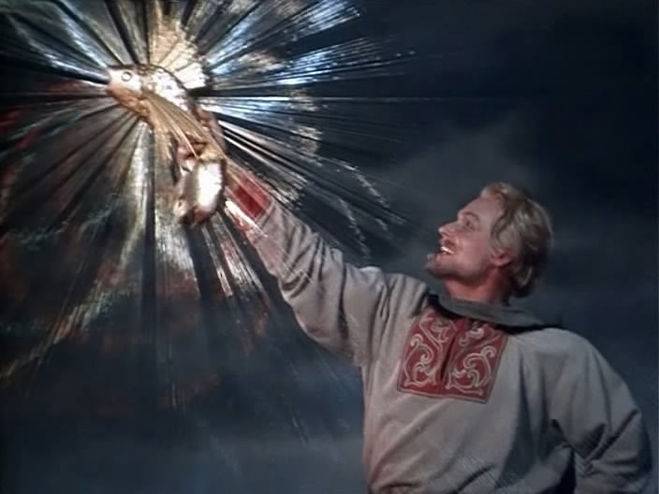
It is not quite clear what value this fish has, and why this mortgage is so interesting for Novgorod merchants: well, there is, perhaps, some very rare fish in the lake. Once a person argues, perhaps he has already caught her, and knows the place where she is found. Why on this insignificant occasion put at stake all his fortune? For the less common, but more logical version, Sadko hires a fishing artel, which catches for him many big and small, red and white fish. During the night, the fish caught (and folded into the barn) turns into gold and silver coins - this is a record of the same Kirsha Danilov.
This ends the first part of the epic Sorokin (and the first songs about Sadko by other storytellers). And the second begins with the fact that, having grown rich, Sadko remains a stranger in Novgorod, and, following the advice of the king of the sea, tries to establish contacts with influential people. But even here he fails, because at this feast there is a new quarrel with the eminent Novgorod. As a result, he again beats the bet that he can buy all the goods of Novgorod. Sometimes he succeeds in this, and he again confuses the Novgorod merchants, but more often Sadko fails (as the goods are brought up all the time: first Moscow, then foreign, and their prices go up). One way or another, Sadko turns out to be the owner of a huge amount of unnecessary goods, which cannot be sold in Novgorod. But with cash, probably already a problem. That is why he has to swim "overseas" - try to realize them: the third, the most fabulous (and, as it is believed, the most ancient and archaic) part of the epic begins.
Through Volkhov, Lake Ladoga and Neva Sadko enters the Baltic Sea, from it to distant countries (in some variants of the epics even India is called), where it successfully sells all goods.
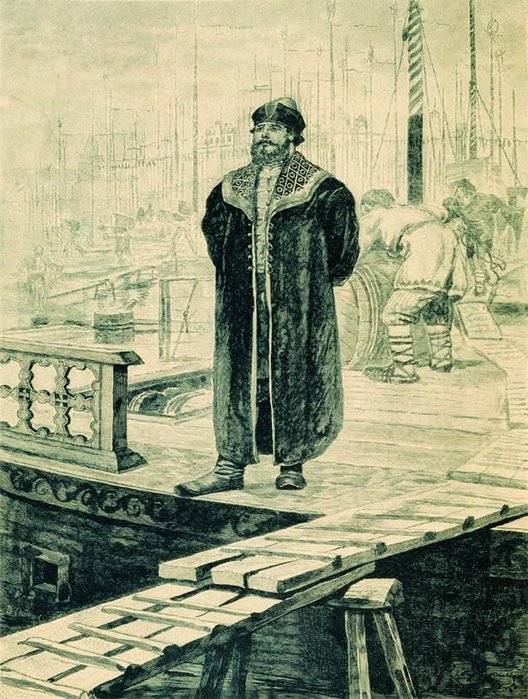
The main adventure begins on the way home. A strange storm strikes the sea: there are huge waves around, the wind breaks the sails, but Sadko’s ships stand still. In the bylinas recorded in the Russian North, Sadko sends to see if his ship is sitting on a “submerged puddle” (underwater scattering of stones, typical of the White Sea). But he himself already realizes that the matter is bad: he, apparently, has some unpaid debts to the sea king, and he is doing everything possible to avoid a meeting with the "benefactor." At first, Sadko resorted to the ancient rite of “feeding the sea”, which was remembered in Novgorod, and in the early twentieth century, fishermen threw bread and salt into the water. Sadko does not waste time on trifles - he orders to throw barrels of gold, silver and pearls into the sea. However, the storm does not stop, and the ships, as before, stand still, and it becomes clear to everyone that a human sacrifice is required (the same Novgorod fishermen still threw a straw effigy into the water as a replacement sacrifice at the end of the 19th century). VG Belinsky, as is known, admired Sadko's "daring", including his willingness to save his comrades at the cost of his life. However, this “readiness” looks somewhat doubtful, and in this situation Sadko behaves not too decently: knowing who the sea king demands to himself, he tries in every way to deceive fate. Initially, he announces that he will go to the sea king, whose lot will be drowned, then - on the contrary, who will remain afloat, and this time he will make his “lot” of iron, while his subordinates will have “veterinary” - all in vain. Realizing, finally, that you cannot outwit the king of the sea, Sadko last time (as he thinks) plays the harp, puts on the most expensive sable coat and orders an oak raft to be lowered into the sea. On this raft he falls asleep, and wakes up already in the sea kingdom. Considering that Sadko wakes up again in the final of the epic story - on the bank of the Chernava River (or Volkhov), some considered him an underwater adventure to be a dream.
So, being at the bottom, Sadko meets with the sea king. There are several versions of the reason for such a "call." According to the first, most prosaic and uninteresting, the king of the sea, really, is not satisfied with not receiving a tribute:
You have always been Sadko, by the sea,
But I, the king, did not cry tribute.
Yes, is it good, Sadko, I bite you alive?
Do you want me to burn you with fire, Sadko? ”
According to the second, he wants to ask Sadko some questions: he demands that he judge him in a dispute with the queen:
Tell me, tell me and tell me
What do you have in Russia is expensive?
We have a conversation with the queen,
Gold or silver in Russia is expensive
Or is there expensive iron iron? ”
Sadko replies that gold is expensive, but people need iron.
In one single version, the sea king wants to play chess with Sadko. But, more often, he wants to once again listen to his playing on the harp and singing.
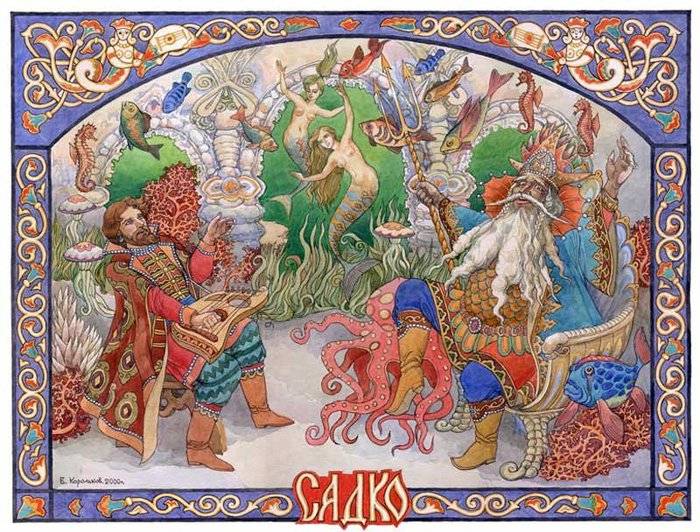
Sadko has to play and sing for three days without a break. He does not know that the tsar’s dance caused a terrible storm on the surface, it was reported to him by a gray-haired, bearded old man, in which Sadko recognizes Saint Nicholas of Mozhaisky. Since, according to the legend, in the Sofia Cathedral of Kiev, a previously drowned but alive and all wet girl was found next to his image, Nicola was often called “Wet” and was considered the patron saint of sailors and in distress.
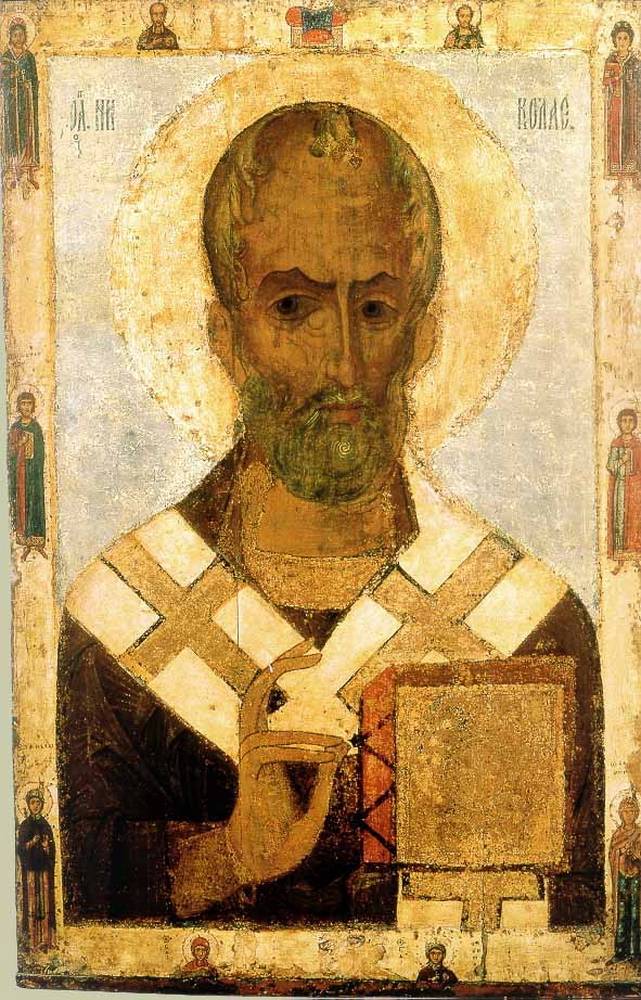
The saint orders to break the harp - break the strings and break the pegs. The sea king stops dancing and the storm stops. This is followed by an “offer that cannot be refused”: the king demands that Sadko accept a new reward and marry in his kingdom. On the advice of St. Nicholas, Sadko chooses the most ugly of the brides offered to him - Chernava. There are two versions of the need for such a choice. According to the first, she is the only earthly girl in the underwater kingdom; according to the second, Černava is the embodiment of a real river flowing near Novgorod.
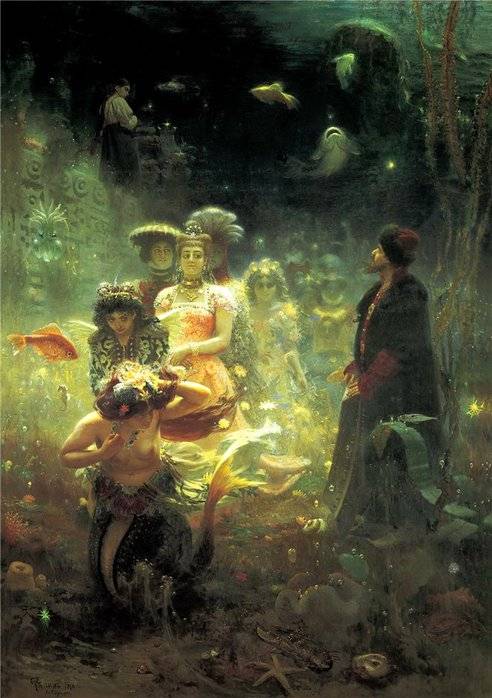
Sleeping after the wedding feast, the hero wakes up on the ground. Soon they return to Novgorod and its ships. The epic ends with Sadko’s promise to build a “cathedral church” in Novgorod.
Are there real prototypes for this Novgorod merchant-hero? It is hard to believe, but the Novgorod chronicles claim that Sadko (Sotko, Stko, Sotka) Sytinich (Sitinits, Stjnich, Sotich), saved by St. Nicholas, built the church of Saints Boris and Gleb in Detinets. And not one, two or three - in total 25 sources speak about it. Among them are: the Novgorod first chronicle of both izvodov, the Novgorod second, Novgorod the third, fourth and fifth, Novgorod Karamzinskaya, Novgorod Bolshakovskaya, Novgorod Uvarovskaya, Novgorodskaya Zabelinskaya, Novgorod Pogodinskaya, the Chronicler of Novgorod masters, the Pskov first chronicle, the Sofia first, Perm Tcherskinskaya, the Chronicler of Novgorod masters, the Pskov first chronicle, the Sofia first, Perm Tcherskinskaya, the Chronicler of Novgorod masters, the Pskov first chronicle, the Sofia first, the Perm Tcherskinskaya, the Chronicler of Novgorod masters, the Pskov first chronicle, the Sofia first, the Perm Tcherskinskaya, the Chronicler of Novgorod masters, the Pskov first chronicle, the Sofia first, the Perm T. chronicle code of the end of the XV century ,, Rogozhsky chronicler, Vladimir chronicler, Resurrection and Nikon chronicles, and so on.
14 sources contain news about the foundation of this church in 1167. It was also reported that it was built on the site of the first, wooden, St. Sophia Cathedral, burned down in 1049 year. And then this church is mentioned many times in annals and acts: it is reported about its consecration (1173), about restoration after a fire (1441), about dismantling for decay (1682).
This is one of two images of the Novgorod Church of Boris and Gleb, which seems to be bigger and higher than the St. Sophia Cathedral, which has come down to our time.
Many researchers believe that over time, frankly fantastic details lay over the real story about a merchant who had been saved at sea. Perhaps the Finnish legends about the singer Vaynemeinen and the sea king Ahto also had some influence. Among the optimists were such authoritative historians as A.N. Veselovsky, V.F. Miller, A.V. Markov and D.S. Likhachev, who made a rather bold statement that "Sadko Chronicles and Sadko bylinas are one and the same person." But everyone, of course, is free to have his own opinion on this matter.
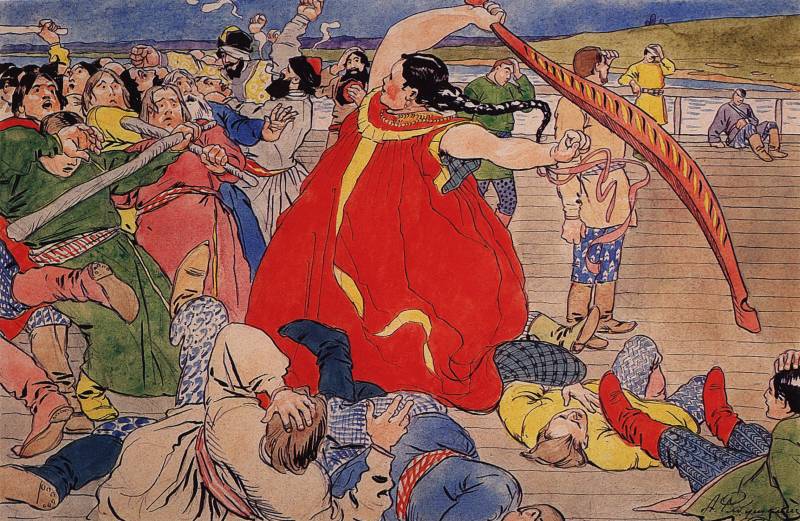
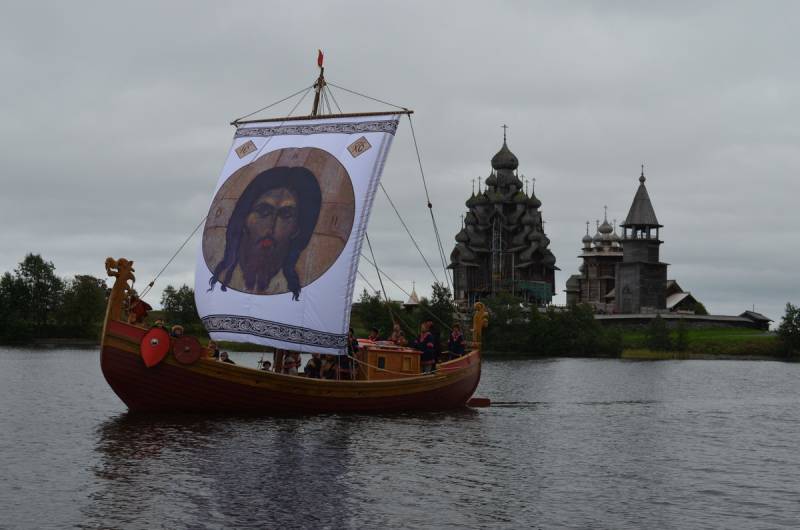
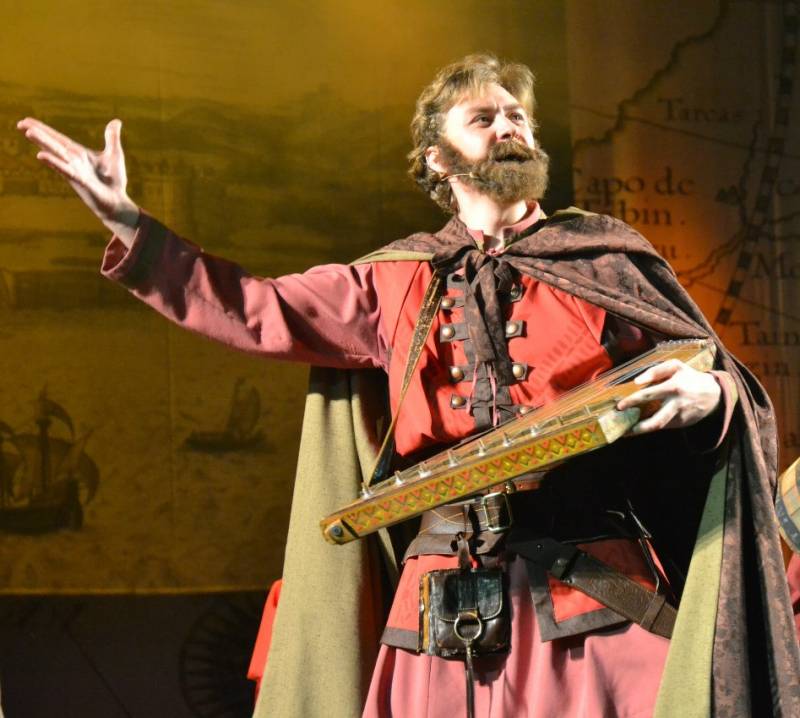
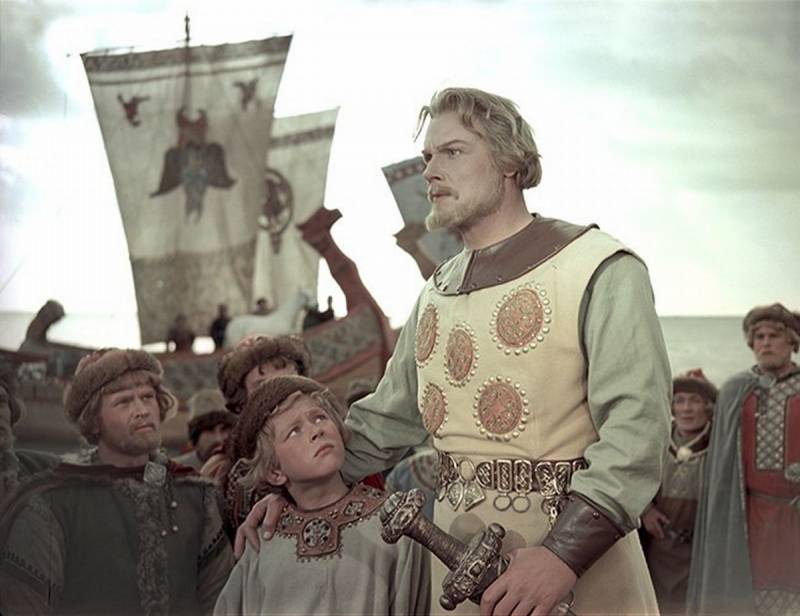
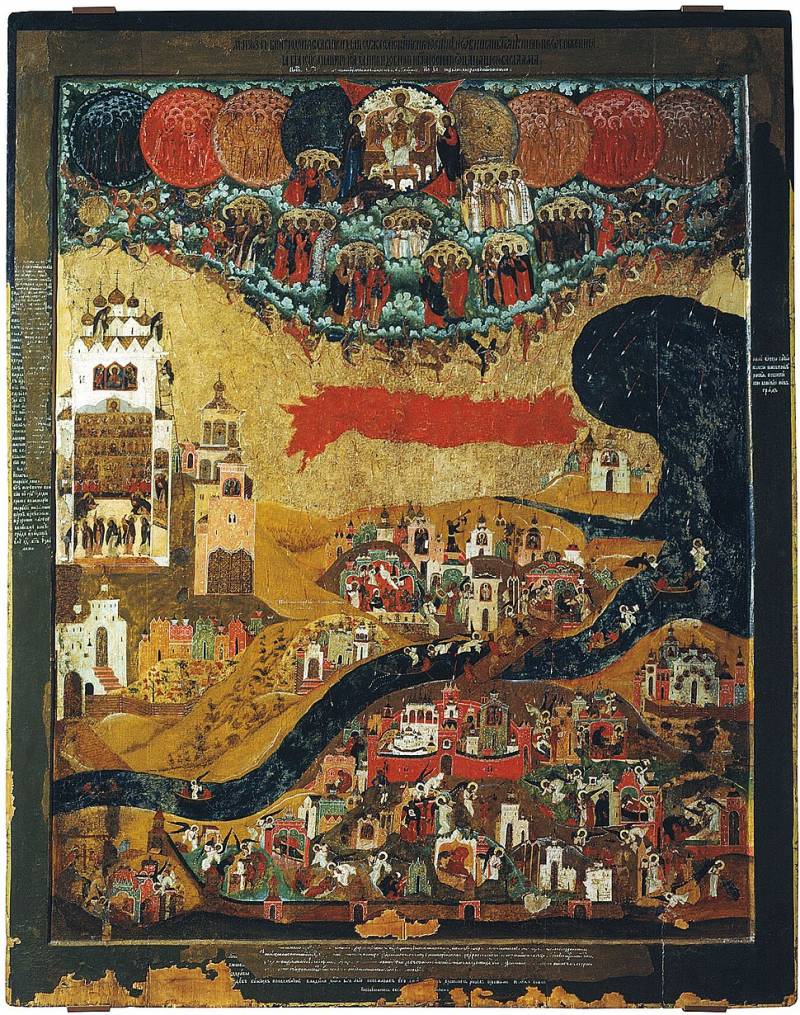
Information